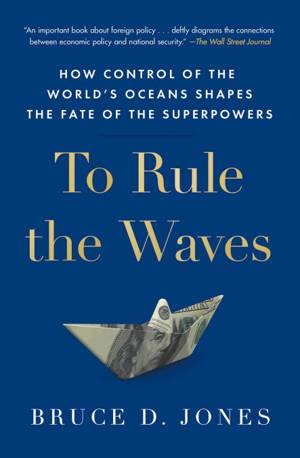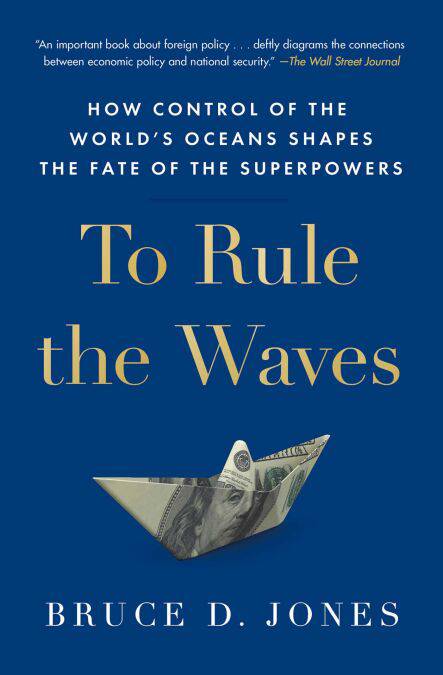
- Retrait gratuit dans votre magasin Club
- 7.000.000 titres dans notre catalogue
- Payer en toute sécurité
- Toujours un magasin près de chez vous
- Retrait gratuit dans votre magasin Club
- 7.000.0000 titres dans notre catalogue
- Payer en toute sécurité
- Toujours un magasin près de chez vous
To Rule the Waves EBOOK
How Control of the World's Oceans Shapes the Fate of the Superpowers
Bruce Jones
Ebook | Anglais
15,65 €
+ 15 points
Format
Description
From a brilliant Brookings Institution expert, an “important” (The Wall Street Journal) and “penetrating historical and political study” (Nature) of the critical role that oceans play in the daily struggle for global power, in the bestselling tradition of Robert Kaplan’s The Revenge of Geography.
For centuries, oceans were the chessboard on which empires battled for supremacy. But in the nuclear age, air power and missile systems dominated our worries about security, and for the United States, the economy was largely driven by domestic production, with trucking and railways that crisscrossed the continent serving as the primary modes of commercial transit.
All that has changed, as nine-tenths of global commerce and the bulk of energy trade is today linked to sea-based flows. A brightly painted forty-foot steel shipping container loaded in Asia with twenty tons of goods may arrive literally anywhere else in the world; how that really happens and who actually profits from it show that the struggle for power on the seas is a critical issue today.
Now, in vivid, closely observed prose, Bruce D. Jones conducts us on a fascinating voyage through the great modern ports and naval bases—from the vast container ports of Hong Kong and Shanghai to the vital naval base of the American Seventh Fleet in Hawaii to the sophisticated security arrangements in the Port of New York. Along the way, the book illustrates how global commerce works, that we are amidst a global naval arms race, and why the oceans are so crucial to America’s standing going forward.
As Jones reveals, the three great geopolitical struggles of our time—for military power, for economic dominance, and over our changing climate—are playing out atop, within, and below the world’s oceans. The essential question, he shows, is this: who will rule the waves and set the terms of the world to come?
For centuries, oceans were the chessboard on which empires battled for supremacy. But in the nuclear age, air power and missile systems dominated our worries about security, and for the United States, the economy was largely driven by domestic production, with trucking and railways that crisscrossed the continent serving as the primary modes of commercial transit.
All that has changed, as nine-tenths of global commerce and the bulk of energy trade is today linked to sea-based flows. A brightly painted forty-foot steel shipping container loaded in Asia with twenty tons of goods may arrive literally anywhere else in the world; how that really happens and who actually profits from it show that the struggle for power on the seas is a critical issue today.
Now, in vivid, closely observed prose, Bruce D. Jones conducts us on a fascinating voyage through the great modern ports and naval bases—from the vast container ports of Hong Kong and Shanghai to the vital naval base of the American Seventh Fleet in Hawaii to the sophisticated security arrangements in the Port of New York. Along the way, the book illustrates how global commerce works, that we are amidst a global naval arms race, and why the oceans are so crucial to America’s standing going forward.
As Jones reveals, the three great geopolitical struggles of our time—for military power, for economic dominance, and over our changing climate—are playing out atop, within, and below the world’s oceans. The essential question, he shows, is this: who will rule the waves and set the terms of the world to come?
Spécifications
Parties prenantes
- Auteur(s) :
- Editeur:
Contenu
- Nombre de pages :
- 400
- Langue:
- Anglais
Caractéristiques
- EAN:
- 9781982127275
- Date de parution :
- 13-09-21
- Format:
- Ebook
- Protection digitale:
- Adobe DRM
- Format numérique:
- ePub

Les avis
Nous publions uniquement les avis qui respectent les conditions requises. Consultez nos conditions pour les avis.






